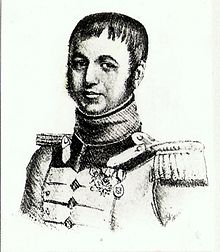Joseph Gaspard Schumacher
Joseph Gaspard Schumacher (* 1776 in Schüpfheim , Canton Lucerne , † 1847 in Orléans ) was a Swiss military person in Napoleonic service. He was a knight of the Legion of Honor and holder of the Ludwig Order .
Affiliation
He is often associated with the Lucerne patrician family of the same name. Apart from possible common roots, there are no close family ties. The tradition of the patrician Schumacher family in Lucerne holds that he liked to pretend to be a member of this important family abroad. That sort of thing happened back then with the same name and homeland and could be beneficial for a career. One would like to believe him simply because of his friendship with Karl Martin Schnyder von Wartensee from another patrician family in Lucerne, his comrade officer on the campaigns in Spain and Russia, and who later, like Schumacher, in the service of King Louis XVIII. kicked. Occasional mix-ups still exist today, as there are two namesakes of his patrician Schumacher family in Lucerne, namely: Caspar Joseph I (1745–1808), commander of the Savoyard Hundred Swiss, and his grandson Caspar Joseph II (1806–1855), officer in the Swiss Guard Regiment of King Karl X.
Life
Joseph Gaspard Schumacher entered the imperial French service as first lieutenant in 1807 and moved to Spain with the 4th Swiss Regiment, where he was captured by the Spanish after the Battle of Baylén . When asked by a war commissioner to convert with promises of great advantages and rapid promotion, Schumacher replied that it was his officer's honor to remain true to his oath and that no one would succeed in diverting him from his duty. After a year Schumacher managed to escape with some officers under dramatic circumstances. Those who had escaped came on their way from Cadix to Madrid via Seville to Cordoba, where Schumacher was warmly received in two houses which he had protected from looting when he was taken. In Madrid the officers were introduced to Napoleon's brother, King Bonaparte, who received them in the throne room and congratulated them on their escape.
After returning to France, the 4th regiment was reorganized and Schumacher was entrusted with the command of a company. During the Russian campaign, the four Swiss regiments formed the 3rd Division of the 2nd Army Corps, which was almost completely wiped out by the numerous Cossack attacks, the Battle of Polotzk and the Beresina. In the icy winter of 1812, the 3rd Division covered the French retreat and enabled the rescue of the Grande Army through their deployment. In a single day, the 4th Swiss Regiment was attacked eight times by Russian cavalry and heavy swarms of infantry under uninterrupted gunfire and wild hurray. When the chief of the 3rd Division, General François Pierre Amey , was surrounded by enemy cavalry and was lying on the ground with his horse, Schumacher rushed over and freed the general. Schumacher's hand was pierced by a Cossack lance, two bullets had perforated his shako , another had got stuck in the wallet filled with letters, a fourth had taken the heel of his right boot, while a bursting grenade tore an Epoulette away from him. After the disbandment of the Grande Army, Schumacher hid in the palace of a Polish prince and recovered in Berlin with his friend, a Count von Sternberg . Via Leipzig, Nuremberg and Strasbourg he reached Nancy, where the remnants of his regiment were organized into a battalion. Schumacher took command of two companies and was ordered to Holland and northern Germany, where further fighting broke out.
After the fall of Napoleon, Joseph Gaspard Schumacher became captain in the 2nd regiment of the Royal Guard in 1814 and on King Louis XVIII. sworn in while Karl Martin Schnyder von Wartensee was serving in the 1st Guard Regiment. Ten years later, the patrician namesake Caspar Joseph Schumacher also served there under Charles X. He was the older brother of Felix von Schumacher , who would later become a general in Naples-Sicily, as well as a friend of beautiful women who had been injured in dueling. After the revolution of 1830 the regiments were disbanded and recalled to Switzerland. Joseph Gaspard stayed in France and moved with his family to Orléans, where he retired as a major.
See also
literature
- Pierre d'Hugues: Journal et souvenirs de Gaspard Schumacher, capitaine aux Suisses de la Garde royale (1798-1830). Paris, 1910.
Web links
- Dominic Pedrazzini: Amey, François Pierre Joseph. In: Historical Lexicon of Switzerland .
| personal data | |
|---|---|
| SURNAME | Schumacher, Joseph Gaspard |
| BRIEF DESCRIPTION | Swiss military, Knight of the Order of St. Ludwig and the Legion of Honor |
| DATE OF BIRTH | 1776 |
| PLACE OF BIRTH | Schüpfheim , Canton of Lucerne |
| DATE OF DEATH | 1847 |
| Place of death | Orleans |
